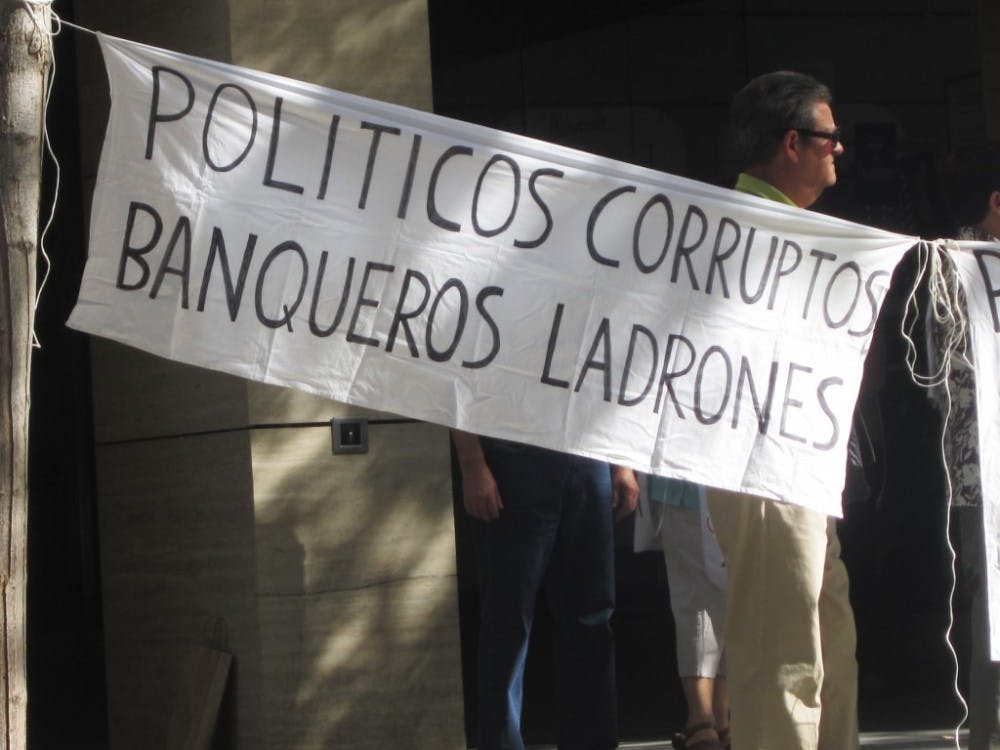SEVILLE, SPAIN — For students, walking home through the center of town from a late afternoon class occasionally involves navigating through an organized, yet noisy, public protest on the cobblestone streets of Seville.
Shiny banners denouncing the government’s newest austerity plan, shrill sounds streaming from plastic whistles, grumbling megaphones and strategically placed clusters of police are slowly becoming part of the regular street scene in the historic city center of Seville. The street demonstrations manifest as peaceful parades of frustrated citizens employ their freedom of speech as a channel through which to communicate with the Spanish government.
Mariano Rajoy, Spain’s current conservative prime minister, is the principal figure on the receiving end of anti-government sentiments expressed by protesters. Spain’s economic situation carries substantial weight in the ongoing eurozone crisis.
Suffering from significant debt, the government recently announced its plans to remedy the financial catastrophe through a series of domestic spending cuts, an agenda which has been met with opposition from the public in all regions of the country.
“The government had two options: spending cuts or raising taxes,” said Antonio Rodriguez, a Spanish citizen and professor of business at the Council on International Educational Exchange. “They chose the cuts. For a conservative government, this choice was fairly expected.”
The proposed program to reverse the national deficit will mean considerably less financial support for both the health care and education systems, which affect Spanish citizens and their futures.
“I believe these are the public sectors that should be untouchable,” Rodriguez said. “These laws will certainly have an effect on the citizens.”
Maria del Mar Colchero Becerril, a student at the University of Seville who has spent her entire life in this Andalusian city, said she believes the new austerity policy will provoke a Spanish diaspora of college graduates seeking better employment opportunities elsewhere in the world.
The high unemployment rate in Spain is just another issue provoking citizens to react negatively against the government. According to the U.S. Bureau of Labor Statistics, the unemployment rate was 25.1 percent as of August 2012, which is an increase from 11.3 percent in 2008.
“Educated people are the means through which the country will move forward, but without a solid educational system in Spain, the future looks bleak for us,” Becerril said.
In both the United States and Spain, the promise for affordable higher education remains a key issue in political debates and public dialogue. Although the average cost for attending university is considerably higher in America, tuition rates in Spain have climbed to rates most Spaniards find unacceptable.
“Post-graduate education fees are absolutely brutal,” Rodriguez said.
Throughout Spain’s major cities from Bilbao to Madrid, street protests voicing resentment against the proposed austerity plan have become increasingly frequent and better organized.
Recently, street protests in Madrid transformed from a nonviolent conglomeration of citizens into a hostile display of antagonism as protesters and police brawled in the streets. Across Spain, video coverage of police battering citizens with bats and rubber bullets aired on local nightly news channels and newspaper headlines referenced the chaos in Madrid.
Rodriguez said he believes the recent violent aspect of the Madrid street protests is an inevitable consequence of the mobilization of citizens against the central government’s social spending cuts.
“This is a desperate situation,” Rodriguez said. “The people are fed up. These protests are not the only things that will occur. We will most definitely see more.”


